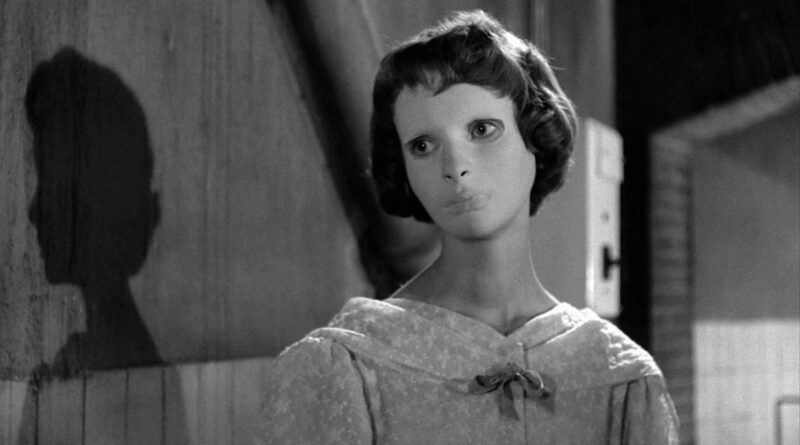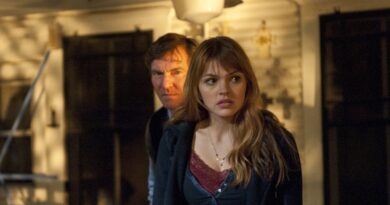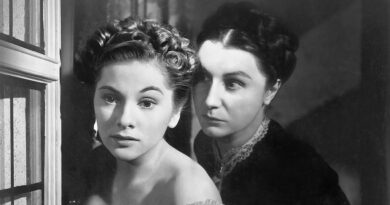The Horror Chamber of Dr. Faustus (1962)
With a title like The Horror Chamber of Dr. Faustus, you would expect to be in for a schlocky gore fest, a midnight-only B movie. But that isn’t the case at all. This French import – initially released in 1960 under the title of the novel it’s based on, Jean Redon’s Les yeux sans visage, which literally translates as Eyes Without a Face – is an original, visually evocative, truly unnerving work of horror. Rather than bombard you with cheap thrills like pop-out scares or monsters or giant insects, director Georges Franju, primarily known in France as a documentarian and film historian, is deliberate in his efforts to get under your skin, to affect you on base emotional levels. It’s a Grand Guignol of the mind as well as the body.
It’s a good film. Two things prevent it from being great. One is the American title, already mentioned. Apart from being awkward and vulgar, it’s misleading; there is a doctor in this film, but his name is most certainly not Faustus. The other is the fact that all the original French dialogue has been dubbed by English-speaking actors. I have yet to see a single foreign language film, good or bad, in which this technique works; the dissonance between the movement of the actors’ mouths and the sounds of the words is so jarring, so unnatural, that it’s always a distraction. It doesn’t help that dubbing has such a bad association with Japanese monster movies. I don’t think the Godzilla films are intended to be funny, but they certainly come off that way when released here in the United States.
Fortunately, even with the dubbing, Dr. Faustus has something the Godzilla franchise doesn’t: A sense of style. There’s a certain morbid beauty in Eugen Shuftan’s black-and-white cinematography, even in shots as shockingly visceral as an entire face being surgically removed from a young woman’s head. It isn’t about lighting it just to make it visible; it’s about revealing a violation so that it will reach all the way to your soul. Unlike with Hollywood monster movies, including similarly themed but very campy films like The Brain That Wouldn’t Die and Mr. Sardonicus, you’re not supposed to enjoy looking at such a thing. The intention is to be repulsed, not just by the gore, but by the awful situation the patient is in. She isn’t a donor. A large piece of her skin, the vast majority of her identity, is being forcefully removed.
The plot may be far-fetched, but because it’s just as emotional as it is visual, I found it easy to suspend disbelief for. It involves a surgeon (Pierre Brasseur) who goes to extreme, unethical lengths to restore the face of his daughter (Edith Scob) after it was disfigured in a car accident. We get only one glimpse of what she looks like, and no, I will not describe it; the rest of the time, she’s either not facing the camera or wearing a white mask, which may have all the physical traits of feminine beauty but completely lacks any semblance of life. It makes her look blank, soulless, as if she were a walking, talking mannequin. A tragic character, she vacillates emotionally between wishing for a new face and simply wanting to die.
Her father, who in medical circles has wild theories about advancements in skin grafting, is more straightforward, essentially the classic mad scientist. He conducts his experiments in an isolated mansion in a makeshift operating room. He procures faces by having a loyal assistant (Alida Valli) kidnap blonde, blue-eyed young women from Paris. And he cruelly tests his grafting procedures on helpless dogs, which are kept locked in cages in a kennel directly next to the operating room; in many scenes, we can hear them in the background barking out their pain and fury. We eventually wonder if he’s truly doing this for his daughter, if this is more about boosting his ego by proving his theories correct. It could be even worse than that; his obsession with making his daughter beautiful again suggests impure, very unfatherly thoughts.
The kidnappings, coupled with the early discovery of a faceless body, naturally arouse the suspicions of the police. However, since this movie is neither a procedural nor a murder mystery, their inclusion is more of a narrative obligation, an inconsequential acknowledgement that the law would notice missing young women. The real aim of The Horror Chamber of Dr. Faustus is to terrify you. So it does. And yet, it doesn’t go about it in the same way as a Hollywood shocker. There are no quick, fleeting scares. It’s a calculated attempt to leave a mark on your psyche. Movies about monsters, aliens, and ghosts can be fun, but they rarely stay with you. This one is guaranteed to, whether you like it or not. And isn’t that the hallmark of a good horror movie?




